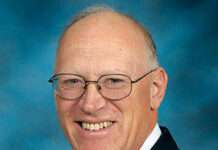Blog will cover many areas that affect healthy living
MANHATTAN, Kan. – It might initially seem simple for each of us to determine what living a healthy life means. Maybe our first inclination is to choose a salad instead of a cheeseburger.
But a group of Kansas State University specialists believes it’s a bit more complex than that. They’ve recently re-booted a blog, called Health Means, to help people from all walks of life figure out the best way to live more healthfully – and in turn, improve the health of their families and communities.
“When we started the Health Means blog, our goal was to start a conversation about health, including what health means to us and what health means to you. That’s still our goal,” said Elizabeth Kiss, a family resource management specialist with K-State Research and Extension.
“Simply put, we believe that health is more than the absence of disease or illness.”
Health Means is available online for free. Two new posts by K-State specialists are available each month.
Kiss notes that the effort involves several educators and researchers at Kansas State University with experience in many areas, including:
• Family life.
• Child development.
• Youth development.
• Adult development and aging.
• Family finances.
• Healthy eating and active living.
• Community health and health policy.
“Some of the issues we are blogging about have a policy basis, or an effect on policy or practices to come,” said Sandy Procter, a K-State Research and Extension nutrition specialist.
One example, Procter noted, is making a decision on whether to be vaccinated or not, and the effect that decision may have on one’s family or community.
“Our goal might be to talk about further-reaching considerations and how important that can be to the people around you,” she said.
Kiss said such topics as family finances and childcare cross over into health.
“We can think of the products and services that we include in our spending plan that are related to health, such as insurance, prescription medications and going to the doctor. Those are all expenses that we have,” she said.
“But there are also other choices we might make with our resources that can impact our health in other ways. Some of that is risk management, which could include wearing seatbelts, foods that we choose to eat and more. All of these things are resources that we have. Health is a type of human capital that we can invest in as individuals, families and as a society.”
In her own blog posting recently, Procter noted that health means having access to quality food, and options for care and exercise, “including such aspects as healthy food or health care or resources like parks and the ability to have outside exercise and safe walkways.”
Other factors playing into healthy living include access to affordable and safe child care, establishing a financial plan while young, mental health, and exposing children to healthy lifestyles when they’re very young.
“All of these factors interplay and none can be taken away without affecting the whole as we’re building health,” Procter said.
Kiss added: “While we as Americans revere this idea of rugged individualism, sometimes we cannot act as rugged individuals. That’s not enough. We have to act as members of a community.
“One of the things we do when we introduce our (blog) contributors is we ask them, ‘What does health mean to you, in one word.’ It means something different to all of us. When we think about setting goals and achieving them, they often start with dreams or visions for the future. So if we can get clear for ourselves what our individual vision of health is, all the different facets of that, and if we then talk about it, I think we can start to achieve that for ourselves.”
FOR PRINT PUBLICATIONS: Links used in this story
Health Means blog, https://blogs.k-state.edu/healthmeans/
K State Research and Extension is a short name for the Kansas State University Agricultural Experiment Station and Cooperative Extension Service, a program designed to generate and distribute useful knowledge for the well being of Kansans. Supported by county, state, federal and private funds, the program has county extension offices, experiment fields, area extension offices and regional research centers statewide. Its headquarters is on the K State campus in Manhattan. For more information, visit www.ksre.ksu.edu. K-State Research and Extension is an equal opportunity provider and employer.
Story by:
Pat Melgares
785-532-1160
melgares@ksu.edu
For more information:
Elizabeth Kiss
785-532-1946
dekiss4@ksu.edu
Sandy Procter
785-532-1675
procter@ksu.edu





